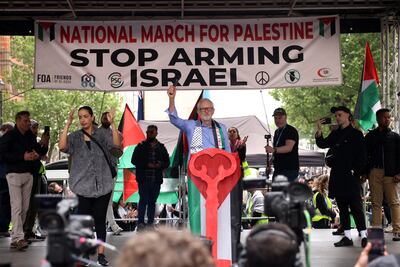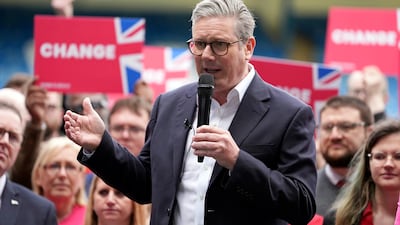Live updates: Follow the latest on Israel-Gaza
A new Labour government in Britain would be willing to recognise a Palestinian state but only “at the right time”, party leader Keir Starmer said on Friday.
Mr Starmer refused to commit to recognition within six months of the UK's July 4 election, which he is widely expected to win.
But he said Britain under Labour would be “under a strong duty” to play its part in a two-state peace settlement in the Middle East.
“I think recognition of Palestine is extremely important. We need a viable Palestinian state alongside a safe and secure Israel, and recognition has to be part of that,” he told the BBC during his first major interview since the election date was announced.
“It has to be part of the process of resolution. I don’t think it should come at the end, because I think there are all sorts of difficulties and problems there.
“It has to come at an appropriate [time], the right time in the process, but I absolutely believe in it.”
Spain, Norway and Ireland this week said they will recognise Palestine in a bid to revitalise the peace process after months of war in Gaza.
Israel reacted with anger, saying recognition would be a reward for Hamas violence.

The UK's Conservative government has said recognition of Palestine will be part of a peace process but should not come now.
It abstained from a UN Security Council vote on the issue last month, saying the world “must start with fixing the immediate crisis in Gaza”.
Labour has faced internal divisions over Gaza, with some members walking out in protest after Mr Starmer was initially reluctant to call for a ceasefire.
There were signs of Muslim voters turning their backs on Labour at local elections last month, although it still scored impressive results.
A group of Labour backbenchers this week signed a letter demanding that the UK defend investigations into Israel at the International Criminal Court.
Corbyn candidacy
Jeremy Corbyn, the pro-Palestinian former Labour leader whose tenure was dogged by anti-Semitism allegations, announced on Friday he will run to be an independent MP.
Mr Corbyn has been suspended from Labour since 2020, when he said the scale of the anti-Semitism problem had been “dramatically overstated”.

A campaign video showed a brief clip of Mr Corbyn speaking at a pro-Palestinian rally, as he said he would hold the next government to account “on issues of peace and justice”.
“We need a politics that represents an alternative to the horrible, corrupt, arid years of this Tory government,” Mr Corbyn said.
His candidacy in Islington North threatens to give Mr Starmer a local headache even as polls show him heading for victory across the country.
Mr Starmer said it was “a matter for Jeremy”.
“We will have an excellent Labour candidate in Islington North making the same argument as we will across the country, which is it’s time to end 14 years of chaos and division, it’s time to turn the page and a fresh start,” he said.
Also pressed on domestic issues, Mr Starmer said abandoned pledges on tuition fees, welfare and constitutional reform were down to the poor state of the economy and a desire to focus on his five declared policy "missions".


